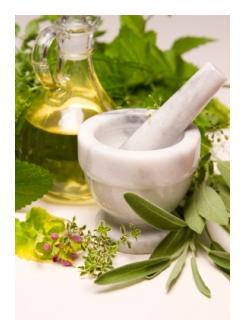Herbalism, the use of plants for health and healing, is as old as humanity, if not older. In hunting/gathering societies, women are naturally the herbalists. This connection between women and herbs continues today. At the turn of the Century, herbalism in America is undergoing a renaissance. Throughout most of the rest of the world, especially in countries where women's wisdom has traditionally been honored, herbalism remains, as ever, the treatment of choice for many acute and most chronic health problems. Herbal medicine is a complex and daunting study; yet it is the medicine of the people and so simple that children safely apply it.
The Wise Woman Tratdition
The earliest known herbalism is the Wise Woman Way: the way of our foremothers out of Africa, our ancient female ancestors. Herbalism is still used and respected in many places, especially the Orient, the mid-East, and India.
Wise women view herbs as spiritual allies and intrinsically important foodstuffs as well as medicines. Psychoactive plants are both teachers and healers, and are used, under the guidance of the herbalist/shaman, by all members of the community. Compassion, connection, community, and honor for the Earth characterize Wise Woman herbalism. The nourishing herbal infusions, mineral-rich vinegars, and edible herbs favored by wise women are generally considered safe, even in quantity, for all women, including those pregnant and lactating.
Favorite herbs include nourishing tonics such as nettle, red clover, oatstraw, comfrey leaf, linden, dandelion, seaweed, and burdock.
The Heroic Tradition
The Wise Woman Tratdition
The earliest known herbalism is the Wise Woman Way: the way of our foremothers out of Africa, our ancient female ancestors. Herbalism is still used and respected in many places, especially the Orient, the mid-East, and India.
Wise women view herbs as spiritual allies and intrinsically important foodstuffs as well as medicines. Psychoactive plants are both teachers and healers, and are used, under the guidance of the herbalist/shaman, by all members of the community. Compassion, connection, community, and honor for the Earth characterize Wise Woman herbalism. The nourishing herbal infusions, mineral-rich vinegars, and edible herbs favored by wise women are generally considered safe, even in quantity, for all women, including those pregnant and lactating.
Favorite herbs include nourishing tonics such as nettle, red clover, oatstraw, comfrey leaf, linden, dandelion, seaweed, and burdock.
The Heroic Tradition
In Europe, and then in the Americas, the Inquisition targeted Wise Woman herbalists/midwives and (often through torture and murder) replaced them with male Heroes, who used herbs to drive out the devils of illness from the hated body. Herbs that caused catharsis and purging were elevated, as was blood-letting.
The Heroic tradition, despising all things female, licensed only men as healers. Anyone who practiced without a license (women) was persecuted. Some escaped to the Americas, learned Native American herbal medicine, and served their communities - only to be vilified and replaced by school-trained male physicians from England several generations later. The Heroic tradition is still popular in Europe and in Latin and Black communities throughout the Americas. Domination, mentation, isolation, and distrust of the Earth (who is female and therefore considered sinful and dirty) characterize Heroic medicine.
Favorite herbs include powerful stimulants and sedatives such as cayenne, lobelia, valerian, ephedra, golden seal, cascara sagrada, turkey rhubarb, and aloes. Most Heroic herbs are dangerous to women, especially if pregnant or lactating.
The Scientific Tradition
Where the practice of medicine becomes dominated by linear, either/or thinking, the Scientific tradition replaces the Heroic. Women and their connection to herbs are again vilified, as quacks, rather than as witches. The quest for powerful drugs brings plants to the laboratory, where active ingredients are extracted, concentrated, isolated, standardized, sanitized, and ultimately synthesized. Plants are raw materials, crude, inexact, and unpredictable.
Approximately 85 percent of the hundreds of thousands of drugs currently used are directly or indirectly derived from plants; eg foxglove (digitalis compounds), Pacific yew (cancer drug), wild yam (cortisone, birth control pills), and chinchona (quinine). Drugs and drug-like herbs cause severe side effects and should not be self-administered by pregnant and lactating women.
Thanks for Read : Herbalism
The Heroic tradition, despising all things female, licensed only men as healers. Anyone who practiced without a license (women) was persecuted. Some escaped to the Americas, learned Native American herbal medicine, and served their communities - only to be vilified and replaced by school-trained male physicians from England several generations later. The Heroic tradition is still popular in Europe and in Latin and Black communities throughout the Americas. Domination, mentation, isolation, and distrust of the Earth (who is female and therefore considered sinful and dirty) characterize Heroic medicine.
Favorite herbs include powerful stimulants and sedatives such as cayenne, lobelia, valerian, ephedra, golden seal, cascara sagrada, turkey rhubarb, and aloes. Most Heroic herbs are dangerous to women, especially if pregnant or lactating.
The Scientific Tradition
Where the practice of medicine becomes dominated by linear, either/or thinking, the Scientific tradition replaces the Heroic. Women and their connection to herbs are again vilified, as quacks, rather than as witches. The quest for powerful drugs brings plants to the laboratory, where active ingredients are extracted, concentrated, isolated, standardized, sanitized, and ultimately synthesized. Plants are raw materials, crude, inexact, and unpredictable.
Approximately 85 percent of the hundreds of thousands of drugs currently used are directly or indirectly derived from plants; eg foxglove (digitalis compounds), Pacific yew (cancer drug), wild yam (cortisone, birth control pills), and chinchona (quinine). Drugs and drug-like herbs cause severe side effects and should not be self-administered by pregnant and lactating women.
Thanks for Read : Herbalism



No comments:
Post a Comment